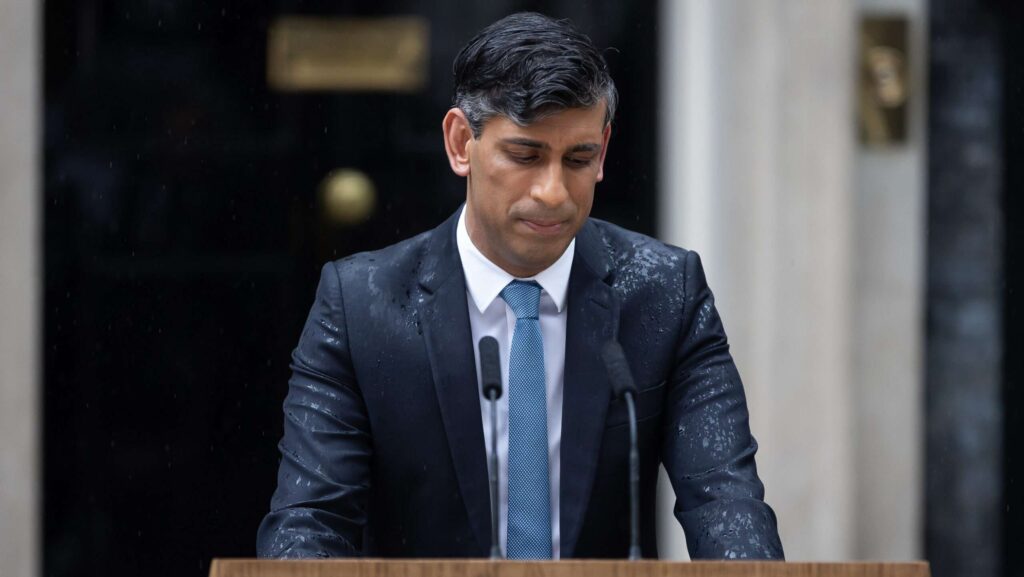The results are in, and they’re overwhelming. After 14 years in power, the British Conservative Party was ousted in the most dramatic way, with the worst election results in decades.
Rishi Sunak has handed in his resignation to the king as he pledges to restore stability after a devastating period of high inflation and political chaos. His successor, the former lawyer-turned-centre-left politician Keir Starmer, will now lead Britain’s first Labor government for nearly 20 years, winning as many seats in parliament as the former prime minister did in 1997. As much as Tony Blair.
What’s wrong with Sunak? Honestly, the better question is where to start. Sunak took office in the autumn of 2022 promising technocratic reforms: a series of five key performance indicator-style promises (on the economy, immigration and the National Health Service) aimed at restoring trust in government. When he called for reelection in May, he had just met his fiscal targets (including halving inflation) but was far from addressing his other goals.
Instead, Sunak’s tenure has been characterized by a lack of vision. although reveal yourself A vocal critic of former Prime Minister Boris Johnson’s lockdown zeal (although he served in Britain’s Covid government), Sunak’s time in power appears to have revolved around small-scale authoritarian interventions aimed at improving teenage behavior. Signature initiatives include criminalizing nearly harmless nitrous oxide, advocating for a smoking ban similar to that proposed by former New Zealand Prime Minister Jacinda Ardern, and consulting on a ban on the sale of smartphones to children under 16 (Like the smoking ban, this was never actually implemented).
Sunak surprised everyone, including many of his parliamentary colleagues, by suddenly announcing an election, before proposing his next big idea: the reinstatement of national service, under which British teenagers would be forced to report for duty once a month. Mandatory community work. At a time of economic uncertainty and frustration, the prime minister looks less like a great political reformer and more like a strict high school principal.
God knows how swing voters will react, polls showing many of them remain extremely angry about Britain’s shabby public services and stagnant economy. By the time the general election came around, the Conservatives trailed Labor in the polls not only in overall numbers but also on policy issues that were once considered their political right, such as illegal immigration (which hit a new high during Sunak’s tenure ).
There are other factors at play in the campaign: not least the return of Reform Party leader Nigel Farage to the political front. Britain’s parliamentary electoral system makes the idea of a Farage-led government simply impossible. But his appeal to a voter base built on Boris Johnson and Brexit is undeniable. poll consistently demonstrate Many former Conservative voters have switched allegiance to Farage’s party.
In the end, Farage’s party won only 4 out of 650 seats. However, by cannibalizing the right-wing vote, they made it easier for Labor to gain seats in northern England and the Midlands. To his credit, Sunak has been warning voters that such an outcome would happen. They either call his bluff or they don’t care.
What about the future? Conservative commentators were quick to point out that there was little enthusiasm for Keir Starmer’s Labor government. It turns out that despite deft use of the electoral system, Starmer’s Labor Party actually received fewer votes (both net and percentage) than far-left Jeremy Corbyn did in 2019 votes gained in the year’s fiasco.
These facts are useful for trivia, but they miss the essential point. British politics is as cynical as the rest of the West. The winner crosses the finish line not because of flag-waving enthusiasm but because they are the least-worst candidate (as was the case with Tony Blair and David Cameron). At the same time, the low vote share can largely be attributed to rising enthusiasm for “third-party” candidates, namely the Lib Dems and the Greens.
Ultimately, Starmer succeeded in betting that he could win over key middle-class voters by removing the naïve radicalism that characterized the Jeremy Corbyn era. This clever branding may win elections, but it won’t translate into programs for effective government. Starmer is not naive in this regard. Apparently, his assistants had prepared a “shit list“Potential policy disasters could derail any honeymoon.
One example on the list is the looming prison crisis. According to official estimates, there are more than 1,000 prisons in the UK 99% full (peak of population growth and decades of failure to build anything). Earlier this year, the Conservatives quietly began releasing prisoners early to make room for new arrivals. At least one of those released was found to be a serious danger to children.
What will Labor do? Starmer’s team briefed the media that they would prioritize building more prison sites. But doing so costs money. Ever since the Liz Truss affair, when a nominally right-wing prime minister alarmed markets by showing enthusiasm for increasing reliance on borrowing, British governments have had to walk the tightest of fiscal tightropes. Fixing the problem may require more taxes, or moving funds from elsewhere.
Still, Starmer has at least to some extent exceeded expectations. When he took control of Labor in April 2020, just months after the party’s worst election result in a generation, even his closest allies were wary of his chances of winning power. Of course he did. As for what will happen next, we can only wait and see.

